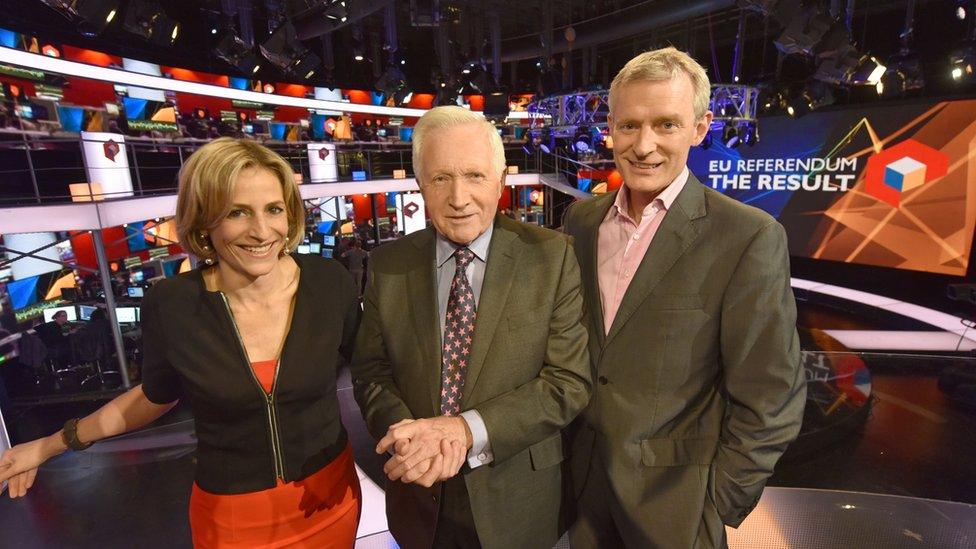Leave campaign ahead in UK's EU referendum vote
- Published
The UK's EU referendum is proving close but the Remain campaign appears to be failing to pick up enough support outside London to win.
At 03:45 BST Leave were ahead by over 500,000 votes, with the English shires and Wales voting strongly for Brexit.
UKIP's Nigel Farage said: "Dare to dream that the dawn is breaking on an independent United Kingdom."
The pound surged as polls closed before falling to its lowest level since 1985, on signs of a Leave victory.
Scotland and Northern Ireland appear to have opted for Remain and London has voted emphatically to stay in the EU.
Unlike at a general election the results in individual areas do not count - it is the overall number of votes cast for one side or the other across the country that will determine whether the UK leaves the European Union.
Polling expert Prof John Curtice said there was still a while to go but at this stage Leave were "undoubtedly the favourites" to win the referendum. He estimates that the finishing post for one side to win is 16,813,000 votes.
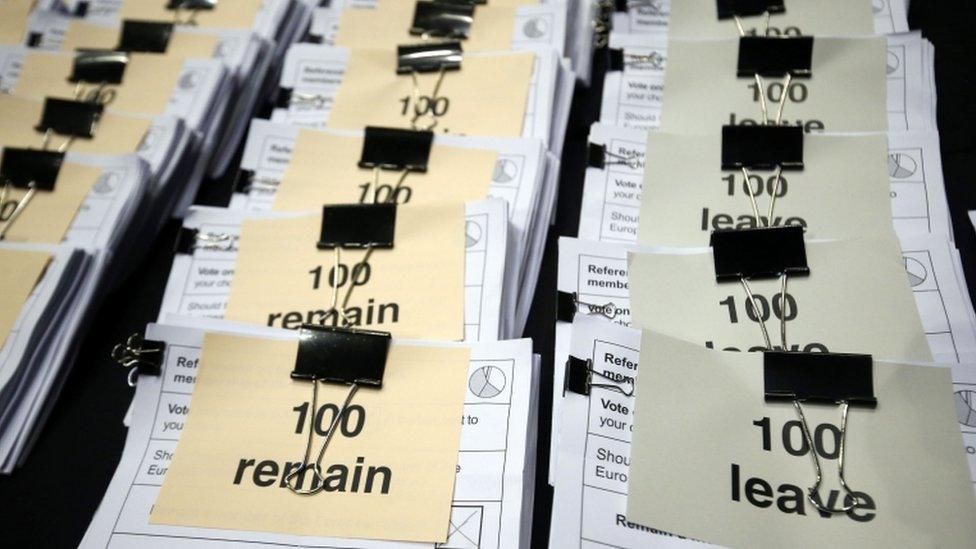
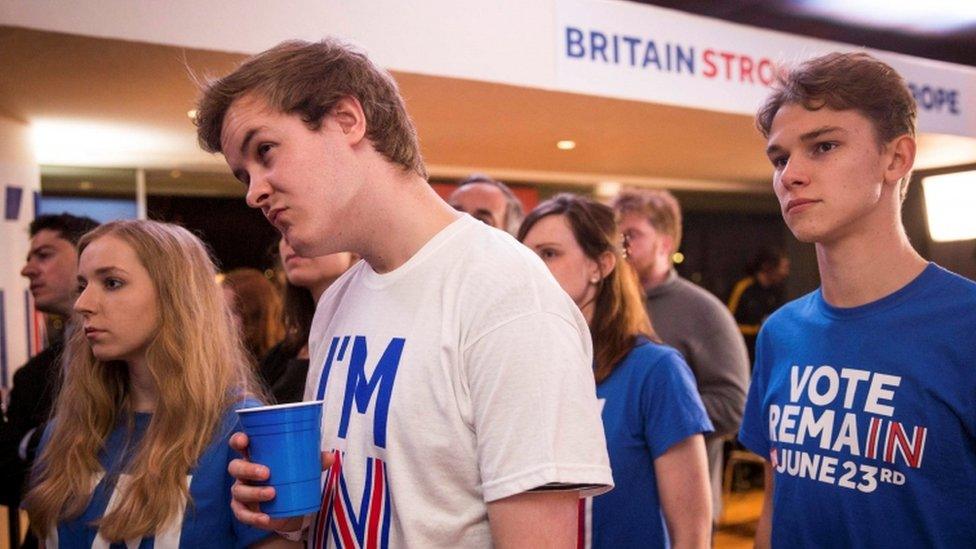
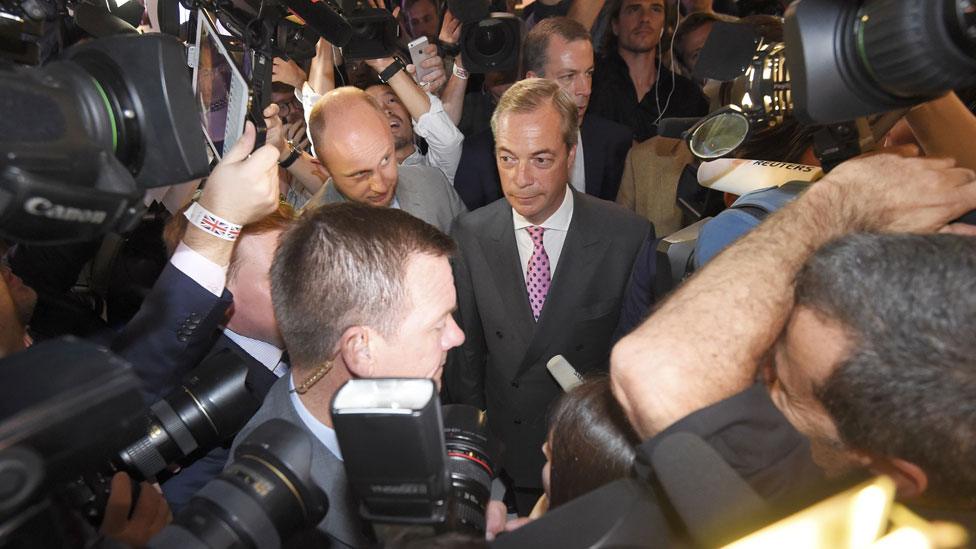
UKIP leader Nigel Farage said he suspected Remain would win
UKIP leader Nigel Farage, who at the start of the night predicted that Remain might "edge" a win, told supporters: "Dare to dream that the dawn is breaking on an independent United Kingdom."
At a Brexit party, he told supporters: "If the predictions are right, this will be a victory for real people, a victory for ordinary people, and a victory for decent people."
"Let June 23 go down in our history as our independence day."
He also suggested the prime minister should resign "immediately" if the UK votes to leave the EU.
Conservative Remain campaigner Justine Greening told the BBC: "It's way too early in the night to be calling it one way or another" but Labour's Chuka Umunna said, looking at the results so far "it's not looking promising for Remain".
Jenny Watson, the Electoral Commission's chief counting officer, will announce the referendum result at Manchester Town Hall after all 382 local totals have been certified and declared.
According to Prof Curtice, the Remain vote is about 10% short of what was expected in north-east England and although Remain is ahead in Scotland, turnout is lower than in the rest of the UK.
Wales appears to be backing Brexit, with a vote of 54.7% for Leave so far.
Northern Ireland appears to be voting in favour of Remain.
Results are starting to come in from the Midlands, Yorkshire and Humber or London and South East of England, where voting was disrupted by flash flooding.
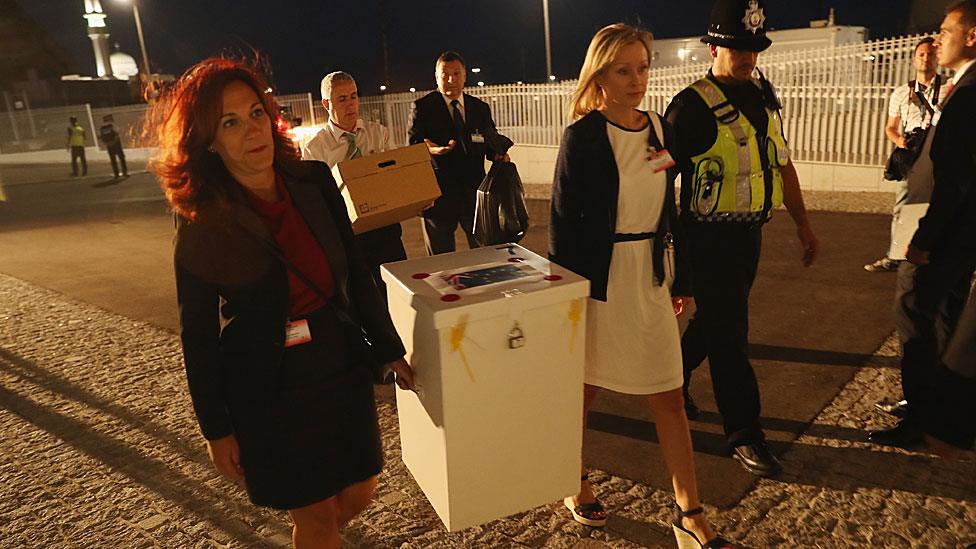
Workers carry ballot boxes to the count in Gibraltar
An online survey taken on polling day of 5,000 people by YouGov suggested the Remain side running at 52% of the vote, to Leave's 48%. Ipsos Mori have released polling from Thursday and Wednesday suggesting Remain will get 54% and Leave 46%.
Former Labour leader Ed Miliband, who backed a Remain vote, said: "It's a nation divided and the PM will have a big responsibility - particularly if it's a Remain win - to show he understands what people are saying on the Leave side of the argument. Labour faces that responsibility too."

Analysis by BBC Political Editor Laura Kuenssberg
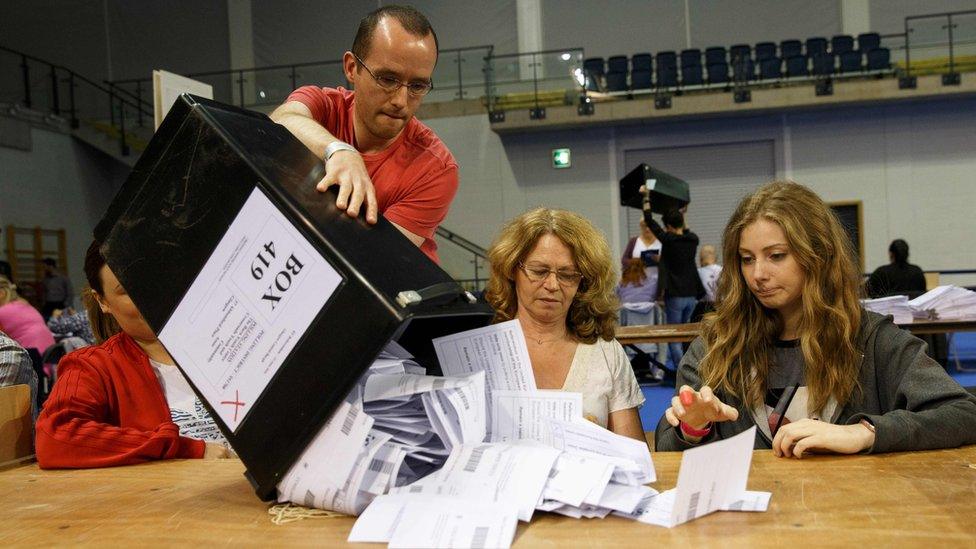
Several months ago, the Leave campaign didn't have much hope that they could get anywhere close in a short campaign.
They characterised themselves as the plucky underdogs, in with a shout, but certainly the real outsiders.
But, in part by using that status, indeed building a narrative of the people versus the elites, they have got themselves to a position where they might end up on the winning side.

The referendum result, which should be known by breakfast time on Friday, could be a turning point in the UK's relationship with Europe and the rest of the world.
If the UK becomes the first country to exit the EU it will arguably be the biggest blow to the 28-nation European Union since its formation.
A vote to remain would see Britain gain exemption from "ever closer" political union and other concessions secured by Prime Minister David Cameron in a renegotiation of the country's membership terms.

Follow the action on the BBC
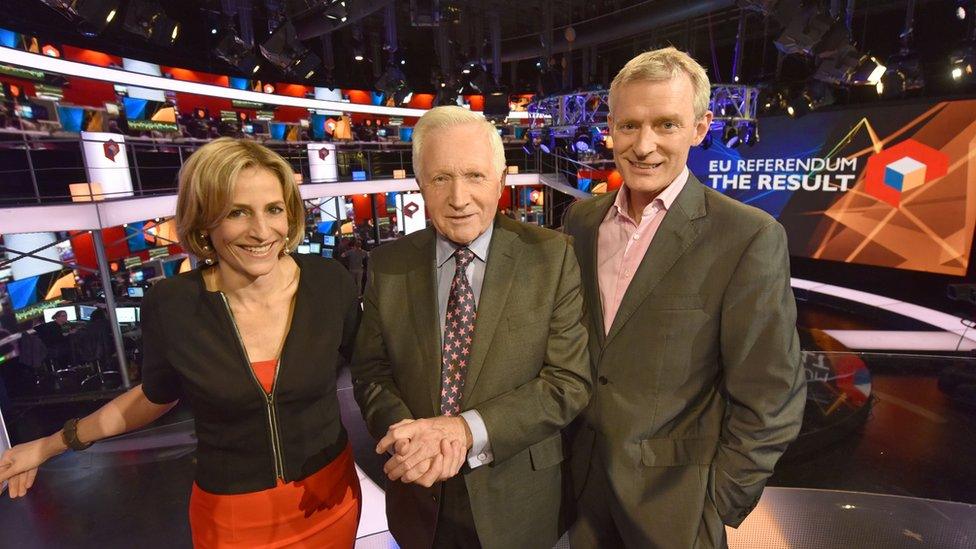
Emily Maitlis, David Dimbleby and Jeremy Vine will host BBC One's coverage
From 22:00 BST, there has been comprehensive coverage on the BBC News website and app with live text and video streaming, reaction and analysis from BBC editors and others. There is also be an up-to-the-minute full results service, external and details of all local results, external.
BBC One, the BBC News Channel and BBC Parliament will broadcast a results show hosted by David Dimbleby alongside BBC experts and special guests from 21:55 BST. Coverage continues through the night and Sophie Raworth, Andrew Neil and Victoria Derbyshire pick up the coverage on Friday morning.
The results programme is being streamed internationally on the BBC News website.
BBC Radio 5 live has coverage as the results come in, as will Radio 4 from 23:00 BST until the Today programme picks up at 06:00 BST on Friday.
From 22:00 GMT, television viewers outside the UK can tune in via BBC World News and BBC World News America. Listeners outside the UK can tune into BBC World Service radio for regular updates.

Many polling stations in the South East of England reported high turnouts despite bad weather, so declarations could be later than previously expected.
There were also concerns that some commuters stranded in London because of chaos on the railways might not have got home in time to vote.
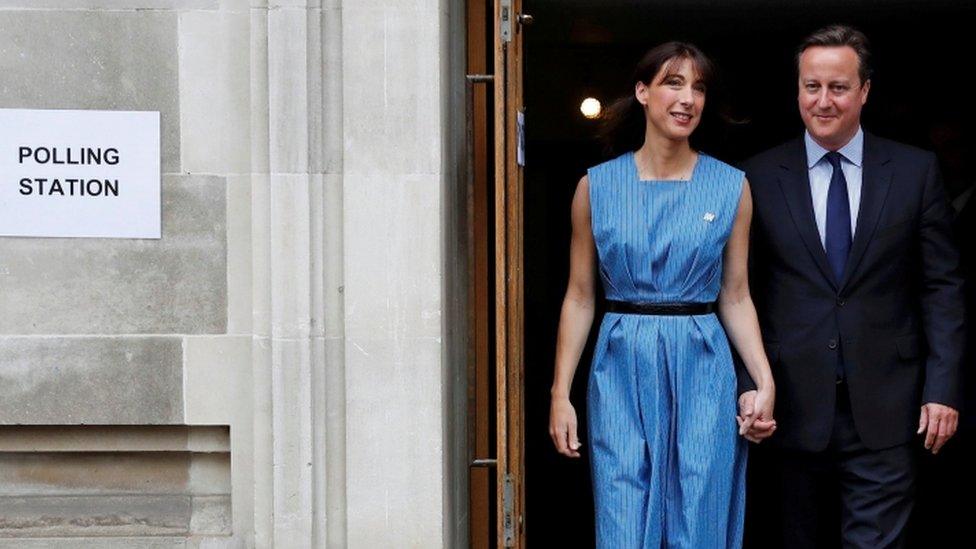
Samantha and David Cameron cast their votes earlier
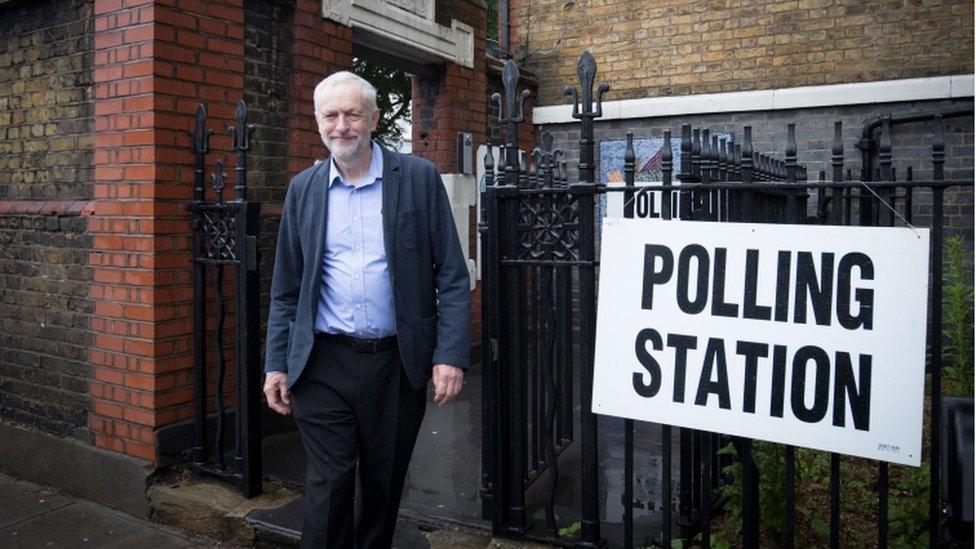
Labour leader Jeremy Corbyn casts his vote
The referendum followed a bitterly-fought four month campaign, which saw Mr Cameron pitted against senior colleagues in his own party, who were campaigning for Britain to leave.
A Brexit vote could deal a fatal blow to Mr Cameron's career as prime minister, although he has vowed to stay on whatever the outcome.
Conservative MP Robert Syms says he and other Vote Leave Tories have written to Mr Cameron telling him he has a "duty" to stay on regardless of the result - the letter has been signed by all the cabinet ministers who broke ranks to back Leave, including Boris Johnson and Michael Gove.
Mr Cameron promised to hold a referendum on Britain's EU membership ahead of last year's general election, following relentless pressure from his own MPs and the UK Independence Party, which was taking votes - and later - MPs from Mr Cameron's Conservatives.
He initially suggested he would be prepared to back an out vote if he did not get what he wanted from his renegotiations.
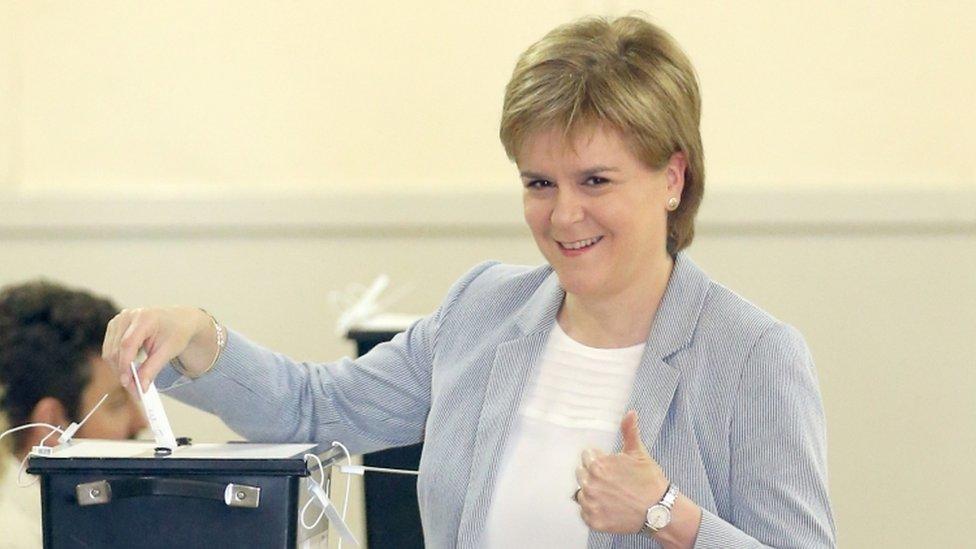
SNP leader Nicola Sturgeon casts her vote
But once the date of the referendum was announced he threw himself into the campaign for Britain to remain, arguing the country would be "stronger, safer and better-off" in the EU.
Nearly all of Britain's opposition parties, including Labour and the Scottish National Party, backed remaining in the EU, along with the majority of business leaders.
The Leave campaign - headed by former mayor of London and Conservative MP Boris Johnson - argued that the only way Britain could "take back control" of its own affairs would be to leave the EU.
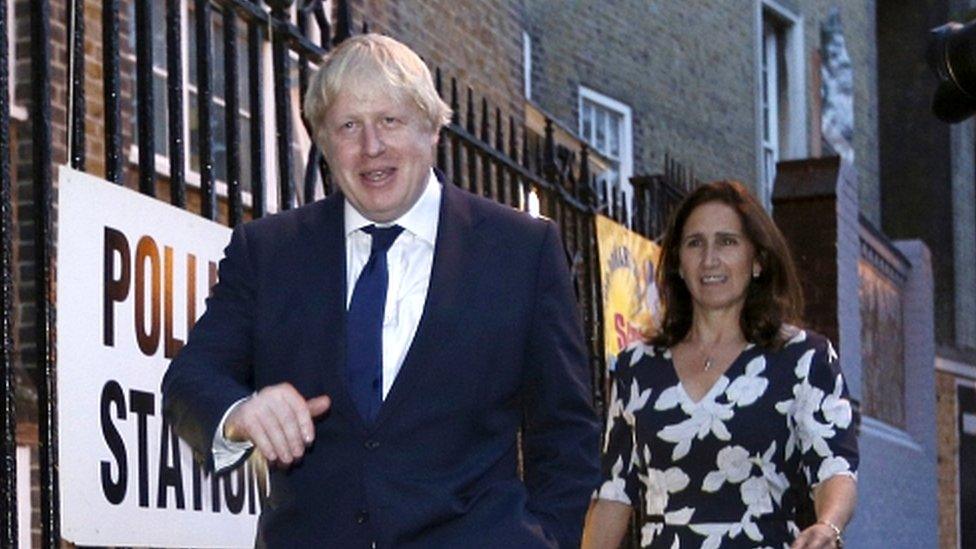
Boris Johnson heads to the polling station
The Leave campaign dismissed warnings from economists and international bodies about the economic impact of Brexit as "scaremongering" by a self-serving elite.
Immigration was a key issue in the campaign, with the Leave campaign arguing that net migration from the EU could never be reduced while the UK was signed up to free movement rules.
- Published19 June 2016
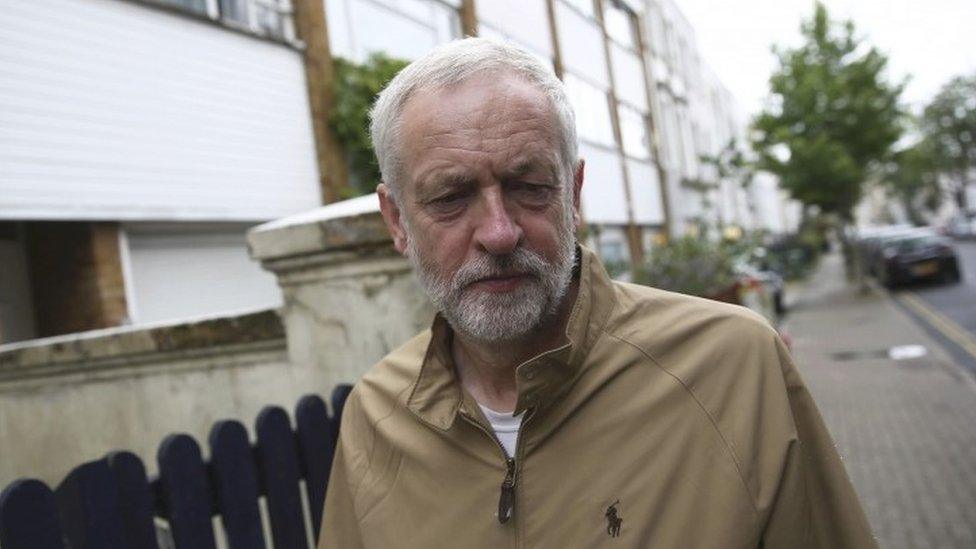
- Published23 June 2016
